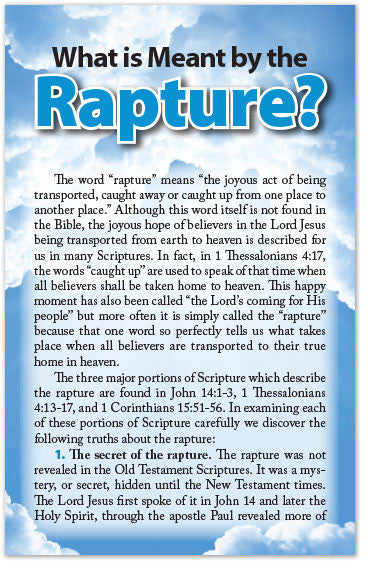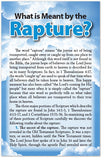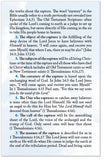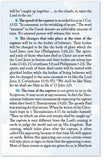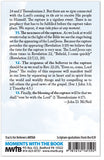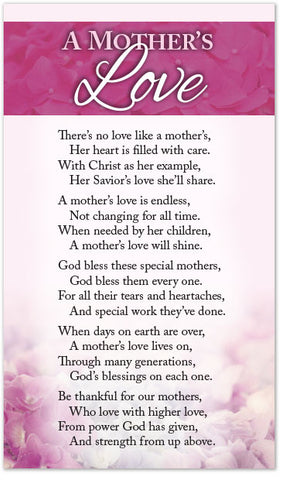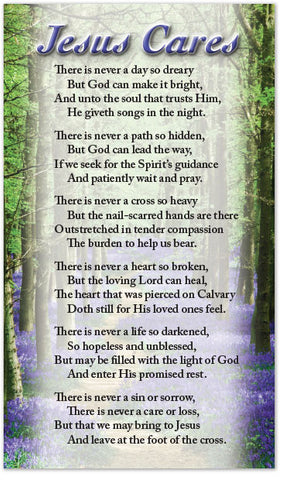What is Meant by the Rapture?
Folded Tract For Believers
- Estimated shipping date: Today (Click for more details)
- SKU:
- Format: Folded Tract For Believers
- Paper: Gloss Text
- Size: 3.5" x 5.5"
- Pages: 4
- Imprinting: Available with 5 lines of custom text
- Version: KJV
Show all item details
The full text of this tract for believers is shown below in the KJV version.
The word “rapture” means “the joyous act of being transported, caught away or caught up from one place to another place.” Although this word itself is not found in the Bible, the joyous hope of believers in the Lord Jesus being transported from earth to heaven is described for us in many Scriptures. In fact, in 1 Thessalonians 4:17, the words “caught up” are used to speak of that time when all believers shall be taken home to heaven. This happy moment has also been called “the Lord’s coming for His people” but more often it is simply called the “rapture” because that one word so perfectly tells us what takes place when all believers are transported to their true home in heaven.
The three major portions of Scripture which describe the rapture are found in John 14:1-3, 1 Thessalonians 4:13-17, and 1 Corinthians 15:51-56. In examining each of these portions of Scripture carefully we discover the following truths about the rapture:
1. The secret of the rapture. The rapture was not revealed in the Old Testament Scriptures. It was a mystery, or secret, hidden until the New Testament times. The Lord Jesus first spoke of it in John 14 and later the Holy Spirit, through the apostle Paul revealed more of the truths about the rapture. The word “mystery” in the Bible usually refers to a truth previously not revealed (see Ephesians 3:4,5). The Old Testament Scriptures often spoke of the Lord’s coming to earth as a judge to set up His kingdom, but never directly of His coming in the air to take His people home to heaven.
2. The object of the rapture is the fulfilling of the deep desire of the Lord Jesus to have believers with Himself in heaven. “I will come again, and receive you unto Myself; that where I am, there ye may be also” (John 14:3; John 17:24).
3. The subjects of the rapture will be all living Christians at the time of the rapture and all those who have died in Christ which includes all Old Testament saints as well as New Testament saints (1 Thessalonians 4:16,17).
4. The certainty of the rapture is based upon the unchanging word of God. In John 14:3 the Lord Jesus says, “I will come again, and receive you unto Myself.” In 1 Thessalonians 4:15 Paul says, “For this we say unto you by the word of the Lord.”
5. The One who raptures or catches away believers is none other than the Lord Himself. He will not send an angel to do this for Him but “the Lord Himself shall descend from heaven” (1 Thessalonians 4:16).
6. The call of the rapture will be the assembling shout of the Lord, the voice of the archangel and the trump of God. Only saved ones will hear that shout
(1 Thessalonians 4:16).
7. The manner of the rapture is described for us in
1 Thessalonians 4:16,17. The Lord Jesus will not come to earth as He will do when He comes to judge the earth at the end of the tribulation period. Dead and living saints will be “caught up together … in the clouds, to meet the Lord in the air.”
8. The speed of the rapture is recorded for us in 1 Cor. 15:52. “In a moment, in the twinkling of an eye.” The word “moment” in the Greek denotes an indivisible amount of time. No unsaved person will witness this event.
9. The changes that take place at the time of the rapture will be in the bodies of believers. Their bodies will be changed to be like the body of glory which the Lord Jesus now has (Philippians 3:20,21). The spirits and souls of those who have died in Christ are now with the Lord Jesus in heaven and their bodies are asleep (see Luke 23:43; 2 Corinthians 5:8 and Philippians 1:23). The spirits and souls of these dead saints will be united with glorified bodies while the bodies of living believers will also be changed at the same moment to be like the Lord Jesus (1 Corinthians 15:51-57). “We shall be like Him; for we shall see Him as He is” (1 John 3:2).
10. The time of the rapture is not given to us in the Scriptures. It may occur at any moment. In fact the Thessalonian believers were momentarily expecting the rapture when they lived (1 Thessalonians 1:9,10). The apostle Paul was waiting for that return. When he writes of the Christian’s hope in 1 Thessalonians 4:17, he includes himself: “Then we which are alive and remain shall be caught up.” The rapture is very different from the Lord’s coming to earth to judge the world and set up His kingdom. That coming, which takes place after the rapture, is often called His appearing because at that time He will appear on earth. Before this appearing can occur certain events will take place as signs to show that the appearing is near. Most of these events or signs are given for us in Matthew 24 and 2 Thessalonians 2. But there are no signs connected with the Lord’s coming in the air to receive His people to Himself. The rapture is a signless event. There is no prophecy that has to be fulfilled before the rapture takes place. We repeat, it may take place at any moment.
11. The nearness of the rapture. As we look at world events today in the light of the Bible we see the stage being set for the appearing of the Lord Jesus. Because the rapture precedes the appearing (Revelation 3:10) we believe that the time for the rapture is very near. The Lord Jesus says three times in Revelation 22, “Behold, I come quickly” (Revelation 22:7,12, 20).
12. The response of the believer to the rapture should be as we read in Rev. 22:20, “Even so, come, Lord Jesus.” The reality of this response will manifest itself in our lives by separating us in heart and in spirit from the world and worldly things and by compelling us to tell others the good news of the gospel. (See 1 John 3:3;
2 Timothy 4:5.)
13. Finally, the blessing of the rapture will be that we shall “ever be with the Lord” (1 Thessalonians 4:17).
—John D. McNeil
Testimonials
“I have had such pleasant experiences spreading the good news of God's great love by giving out the "Somebody Loves You" tracts. I walk up to someone who looks sad and lonely and I say, "Did you know somebody loves you?" Their faces brighten, they get a big smile and all...” more
“I am currently an inmate and was given a tract called "Why Did This Happen To Me?" It has helped me to grow stronger in my faith and I put all of my trust in the Lord now. I have read from this tract to other inmates in our little...” more
“When I leave the house, I always grab a handful of Bible tracts. You never know when God will send somebody your way unless you are prepared. I've been sowing seeds for about 50 years.”
“I love your tracts and believe they are a tremendous witnessing tool! Presently, my favorite tract is "Have a Good Day!" As people say, "Have a good day," I respond by handing them this tract and replying, "You have a good day as well, and here is something for you to...” more
“Oh, how thankful I am for your soul winning ministry and for those who are able to support you. I am happy to report that by the time you receive this letter, all of the gospel "seeds" (tracts) that you sent me will have been planted in the large field...” more
“I wanted to acknowledge and appreciate your wonderful heart of love being extended to us here in Africa. It was so wonderful that you sent us timely messages for hungry souls. They are touching many souls and blessing many. My heart is full of thanksgiving when we receive letters of...” more
“We want to thank you for your supply of tracts that we received. Praise God that here we are allowed freedom of worship. Your literature is being distributed freely to churches and individuals who testify that they are blessed by your publications. It's a blessing to join with you in...” more
“Thank you for the gift you sent to me. It was a blessing. You guys always put the joy and love in everything you do. I will share all the tracts with everyone that crosses my path. Let's continue to plant those seeds of salvation by His grace.”
“What a blessing it is to be a part of your ministry. You make sharing the gospel fun, exciting, and efficient!”
What Is Imprinting?
If you select “add imprinting”, we will personalize this tract for you. You can use the space provided to add up to 5 lines of text. It’s a perfect way to include contact information for your church, ministry, or business!
→ For more information please visit our imprinting help page.

Imprinting Questions
How much does imprinting cost? The imprinting charge is $5 per pack.
How long does it take? Orders of less than 3,000 copies (per title) take about 2-3 business days for printing. Orders of 3,000 or more copies (per title) usually require 2-3 weeks for printing.
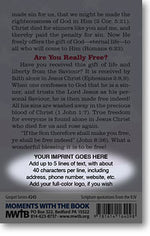
Where does my information go? Every tract has a space reserved on the back page for imprinting. A live preview is shown on your screen as you enter your text.
Can I add a logo or image? Yes, you can upload your own custom logo or image and it will be printed in full color. If your logo doesn't look quite right after uploading it, don't worry: all jobs are carefully reviewed before printing and we will custom-fit everything together for you.
Do I have to enter my imprint over and over? If you're logged in to your account, any imprints you create will be saved so you can re-use them with a single click.
→ For more information please visit our imprinting help page.

